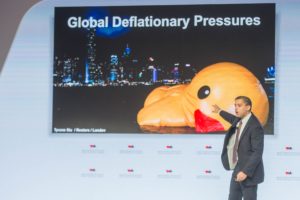ASF 2019: China-US Rivalry Much More Than Trade War, Warns Dr Vikram Mansharamani
The world could be looking at a cyclical recession within the next three years, with performance across nearly 10 indicators – ranging from geo-political and macro-economic to demographic and industrial – showing alarming similarities to the period prior to the technology boom in the late 1990s that was followed by a significant global downturn.
Dr of Vikram Mansharamani, of Harvard of University Lecturer And Author Of Boombustology: Spotting the Financial Bubbles Before They ‘re Burst , spoke steering On Monday At The 12 Th Arab Strategy Forum All ( the ASF 2019) In Dubai , At of a Session Titled ‘Is The : World the Heading Towards of a the Global Economic Recession? ‘
“In the next 24 months, there is a high probability that we are going to hit many of the indicators that usually come 12-18 months before a global recession. We are within 36 months of a recession. I feel very comfortable saying that it is a high-probability event, “he said.
During his session, Mansharamani explored themes related to excessive supply and receding demand, a rise in populism, nationalism and protectionism, as well as trade wars between countries.
He outlined indicators to watch out for to predict a recession, including the technology bubble and the uncertainty surrounding the impact of big tech policies on the global economy.
Speaking about the US-China rivalry, Mansharamani emphasizes that it is much more than a trade war. He noted that it involves a technology war with a space race, arms race and a currency war thrown in, and is set to escalate into a great power rivalry involving the Belt and Road Initiative and the accompanying financial infrastructure, which may lead to the emergence of two global economies.
Mansharamani also highlighted the importance of perspective in viewing the recession as an opportunity to introduce reforms and make aggressive strides in trade.
In the run-up to the 2019 edition of the Arab Strategy Forum, Good Judgment Inc published a report titled ’11 Questions for the Next Decade ‘. The report has found that a significant 76 per cent of respondents believe that the world will avoid another Great Recession through 2030. While it might witness a cyclical global recession, it would require negative sentiment and a large, unexpected catalyst – such as a mismanagement of debts, an escalation of the US-China rivalry, or an international conflict that disrupts critical trade routes and supply chains – to bring a Great Recession to fruition.
Mansharamani is a global trend-watcher, who teaches Harvard students to use multiple perspectives in making tough decisions.








